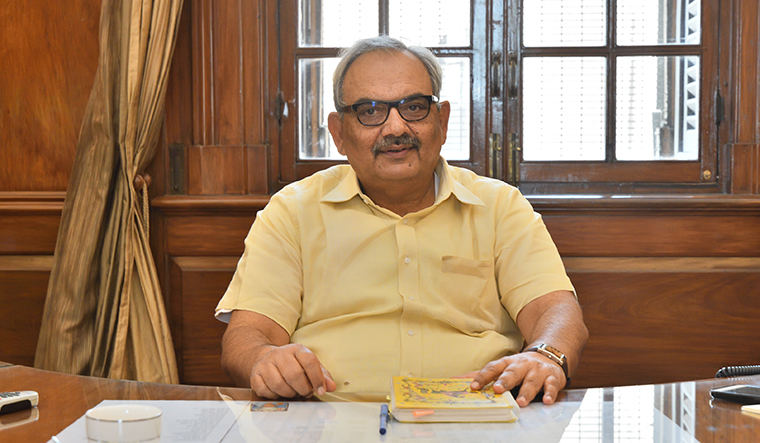As the government brainstorms on how to minimise the economic fallout of the Covid-19 lockdown, Comptroller and Auditor General Rajiv Mehrishi says we need to shift focus from worrying about GDP to increasing what he calls GGP, or gross goodness product. Mehrishi, an external auditor of the World Health Organization and member of the United Nations board of auditors, spoke to THE WEEK on how India can tackle the challenges.
Excerpts from the exclusive interview:
Q/ What do you think will be the economic impact of this crisis?
A/ That there will be a worldwide economic fallout is not debated. The extent of the adverse impact is what economists and policymakers will have to think about. But GDP growth cannot be the main focus at this point of time. It is better to be poor than be dead. As Warren Buffett famously said, you have to survive to succeed.
Once the infection curve starts flattening, we can start discussing the best ways of handling an economic situation where both top and bottom lines of companies would have shrunk, the purchasing power eroded, and tax revenues of the government reduced. But there are also silver linings—[there is] still a pretty large [domestic] market, low oil prices and, by all accounts, a bumper rabi crop.
Q/ India has witnessed disasters in the past. What lessons have we learnt?
A/ All of us need to understand that this is a major disruption—of the kind we have not witnessed in the last four or five generations, perhaps since the 1918 flu. Once we understand this, and most of us seem to have, what we do not need to do is indulge in armchair criticism, or display our post-facto six-by-six vision and wisdom. By all means, make constructive suggestions. But, at a time when the authorities are faced with an unprecedented challenge—most doctors and officials involved in handling the crisis are doing 18-hour shifts—distracting them with criticism and court cases is really only shooting ourselves in the foot.
What we need to do instead is to fully abide by the lockdown and government instructions, which are based on the best medical advice available, and not add to the problem by violating them. What we also need to do is to see how we can help. For instance, can we give money or rations to those who most need them—our colony’s dhobi, carpenter, electrician or the kacchi basti nearby? Raising the GDP and per capita income is indeed important, but as a nation, we also need to increase what I call gross goodness product, or GGP, especially at times like this.
Q/ How can the government reach out to those who are not covered under the various welfare schemes? Migrant labourers, for instance.
A/ The problem of migrant labour is a real conundrum. In times of crisis, we all want to go home, for both economic and emotional reasons. In India, the numbers involved are very large, perhaps around 100 million. On the other hand, sending back people from the cities may mean spreading the infection to rural areas. That is a genuine and major risk.
So, for migrant labourers who are still in cities, or those who are trudging back home, can we make sure that they have food, medicines and water? As you can see, a lot of this is already happening, with efforts being made both by the government and civil society. I hope more of us well-to-do people would join in to help, directly or by contributing to an organisation or fund of one’s choice. Also, a majority of migrant labourers have Jan Dhan accounts. The transfer announced by the government recently should help the poor tide over any immediate crisis.
Q/Apart from the medical emergency, what are the major challenges currently facing us?
A/Two critical things. First, the challenge of ensuring availability of essential items—milk, groceries, vegetables and medicines. This is a huge organisational and management challenge in a country as large as ours, with so much inter-state movement involved.
Second, the maintenance and continued supply of essential services like electricity and water, and a minimum level of municipal services. The nation has rightly recognised the selfless service of doctors and the medical staff that support them. They have also been insured for 051 lakh each.
Similarly, we also need to spare a thought for the officials who are directly handling the crisis. The municipal workers and officials maintaining our power and water supplies; secretariat and district-level officials and the police, who are monitoring the lockdown and maintaining public order with extraordinary resolve and effort.
Q/ The government is incurring a lot of expenditure in providing food, shelter and quarantine facilities and in procuring medical supplies such as ventilators and personal protective equipment. Will the CAG audit these expenditures strictly for compliance with rules and procedure?
A/ We do not work in a vacuum, oblivious of our surroundings or circumstances. Even normally, we do try to distinguish between bona fide action and incompetence or ill-intent.
Q/ Any positives you can think of?
A/ First, many companies will rethink their China-based operations. Wet markets (a place that sells meat, fish and other perishable goods) may well become a tipping point. If we do some things right, we can attract these companies to India. They are employers and job multipliers.
Second, we have much to learn from the clear night sky and good air quality observed in dozens of cities across the world. We humans really have to reinvent the way we live, work and produce goods and services. This crisis may just provide the impetus for that.


